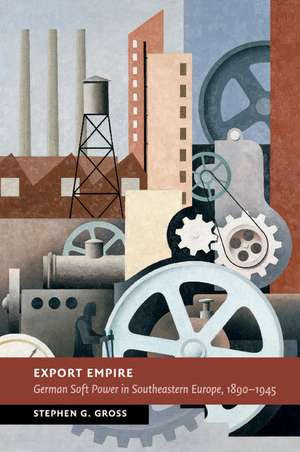Export Empire: German Soft Power in Southeastern Europe, 1890–1945: New Studies in European History
Autor Stephen G. Grossen Limba Engleză Paperback – 7 feb 2018
| Toate formatele și edițiile | Preț | Express |
|---|---|---|
| Paperback (1) | 322.67 lei 6-8 săpt. | |
| Cambridge University Press – 7 feb 2018 | 322.67 lei 6-8 săpt. | |
| Hardback (1) | 758.22 lei 6-8 săpt. | |
| Cambridge University Press – 4 ian 2016 | 758.22 lei 6-8 săpt. |
Din seria New Studies in European History
-
 Preț: 177.91 lei
Preț: 177.91 lei -
 Preț: 238.02 lei
Preț: 238.02 lei -
 Preț: 208.50 lei
Preț: 208.50 lei -
 Preț: 398.42 lei
Preț: 398.42 lei -
 Preț: 237.92 lei
Preț: 237.92 lei - 9%
 Preț: 593.91 lei
Preț: 593.91 lei -
 Preț: 180.06 lei
Preț: 180.06 lei - 9%
 Preț: 592.61 lei
Preț: 592.61 lei -
 Preț: 169.70 lei
Preț: 169.70 lei -
 Preț: 211.13 lei
Preț: 211.13 lei -
 Preț: 166.99 lei
Preț: 166.99 lei -
 Preț: 266.53 lei
Preț: 266.53 lei -
 Preț: 241.90 lei
Preț: 241.90 lei -
 Preț: 429.99 lei
Preț: 429.99 lei -
 Preț: 400.05 lei
Preț: 400.05 lei - 11%
 Preț: 698.50 lei
Preț: 698.50 lei -
 Preț: 275.85 lei
Preț: 275.85 lei -
 Preț: 330.09 lei
Preț: 330.09 lei - 11%
 Preț: 695.93 lei
Preț: 695.93 lei -
 Preț: 423.10 lei
Preț: 423.10 lei -
 Preț: 340.13 lei
Preț: 340.13 lei - 11%
 Preț: 698.30 lei
Preț: 698.30 lei -
 Preț: 326.82 lei
Preț: 326.82 lei -
 Preț: 339.37 lei
Preț: 339.37 lei -
 Preț: 396.59 lei
Preț: 396.59 lei -
 Preț: 383.48 lei
Preț: 383.48 lei -
 Preț: 292.40 lei
Preț: 292.40 lei - 14%
 Preț: 682.94 lei
Preț: 682.94 lei -
 Preț: 282.75 lei
Preț: 282.75 lei -
 Preț: 417.07 lei
Preț: 417.07 lei -
 Preț: 437.18 lei
Preț: 437.18 lei - 14%
 Preț: 873.67 lei
Preț: 873.67 lei -
 Preț: 420.40 lei
Preț: 420.40 lei -
 Preț: 319.99 lei
Preț: 319.99 lei - 14%
 Preț: 687.39 lei
Preț: 687.39 lei -
 Preț: 397.01 lei
Preț: 397.01 lei - 11%
 Preț: 695.93 lei
Preț: 695.93 lei - 11%
 Preț: 543.84 lei
Preț: 543.84 lei
Preț: 322.67 lei
Nou
Puncte Express: 484
Preț estimativ în valută:
61.75€ • 64.23$ • 50.98£
61.75€ • 64.23$ • 50.98£
Carte tipărită la comandă
Livrare economică 14-28 aprilie
Preluare comenzi: 021 569.72.76
Specificații
ISBN-13: 9781107531482
ISBN-10: 1107531489
Pagini: 400
Ilustrații: 5 b/w illus. 1 map 32 tables
Dimensiuni: 150 x 228 x 22 mm
Greutate: 0.54 kg
Editura: Cambridge University Press
Colecția Cambridge University Press
Seria New Studies in European History
Locul publicării:New York, United States
ISBN-10: 1107531489
Pagini: 400
Ilustrații: 5 b/w illus. 1 map 32 tables
Dimensiuni: 150 x 228 x 22 mm
Greutate: 0.54 kg
Editura: Cambridge University Press
Colecția Cambridge University Press
Seria New Studies in European History
Locul publicării:New York, United States
Cuprins
Introduction: the foundations of soft power and informal empire; Part I. German Power in the Wilhelmine Empire and the Weimar Republic: 1. The legacy of Wilhelmine imperialism and the First World War, 1890–1920; 2. The economics of trade: building commercial networks in southeastern Europe, 1925–30; 3. The culture of trade: cultural diplomacy and area studies in southeastern Europe, 1925–30; 4. The politics of trade: Paneuropa, Mitteleuropa, and the Great Depression, 1929–33; Part II. Nazi Imperialism: 5. Stabilising the Reichsmark bloc: commercial networks in the Third Reich, 1933–9; 6. Economic pioneers or missionaries of the Third Reich? Cultural diplomacy in southeastern Europe, 1933–9; 7. Forging a hinterland: German development aid in the Balkans, 1934–40; 8. The Second World War: informal empire transformed, 1939–45; Conclusion: imperialism realised?
Recenzii
'Overall, this is an extremely valuable book for economic historians as it underlines that the study of international trade and economic development cannot be separated from the broader power struggle during the period 1890–1945. In doing so, the book sheds light on the previously unknown mechanisms that contributed to the rise of German empire at the heart of Europe, a process which eventually led to the Second World War. In this regard, it is likely to remain a key reference work for years to come on German imperial and economic history.' A. Coşkun Tunçer, Economic History Review
'An absorbing portrait of German interest in Yugoslavia and Romania during the first half of the long twentieth century.' Patricia Clavin, The Journal of Modern History
'An absorbing portrait of German interest in Yugoslavia and Romania during the first half of the long twentieth century.' Patricia Clavin, The Journal of Modern History
Notă biografică
Descriere
A major new interpretation of Nazi influence in southeastern Europe through the concepts of soft power and informal empire.











